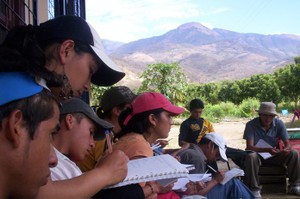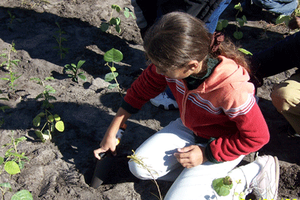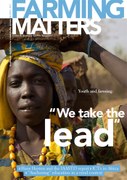Governmental efforts aimed at rural children and youth can be more effective if the departments of education and agriculture co-ordinate their goals and policies.
This article contrasts the incongruities in a national initiative of the Ministry of Education in Ecuador with a regional programme that purposefully sought to strengthen such connections and links, with successful results.

One of the policy goals of the Ministry of Education of Ecuador is that young people master the knowledge and skills they need to incorporate themselves into the labour force. However this goal is seriously undermined by the high malnutrition rates found in children of less than five years of age – a period where crucial brain development takes place, which cannot be compensated for later in life.
So a nation-wide nutrition programme was designed, hoping to reach all schools in the country. But this programme is forcibly changing young people’s diets and helping dilute traditional knowledge and skills at a time when they are most needed in the rural areas.
Although its objectives are clear, the implementation of the School Breakfast Program (PAE) contradicts some of the basic principles of nutrition practice itself, as well as the government’s own political agenda. PAE boasts that it reaches even the most remote communities in the rainforest with the same flavoured porridge and individually packed white flour biscuits being distributed across the country.
Yet, the country’s 2008 Constitution and related laws explicitly endorse traditional knowledge, organic agriculture and agrobiodiversity, as well as the “culturally appropriate and healthy self-sufficiency of communities”, “the purchase of produce for social programmes from small-scale farmers” and “the distribution of food that promotes equity between rural and urban spaces”. Can’t PAE be better connected to the situation and needs of the remote rural communities?
Positive attempts
Similar linkages and interrelations are also visible (in more positive ways) in other examples. One of these is the Ministry of Education’s support for an alternative agricultural education programme. The “Improvement of Technical Agricultural Education” programme, or PROCETAL, ran in the southern province of Loja between 2003 and 2008.
Implemented with the support of two Flemish development organisations, it was the result of extensive research conducted by the Centre for Experiential Education of the University of Louvain (Belgium). PROCETAL aimed at improving learning results in secondary schools by “anchoring” education in the reality of farming students. By the end of 2008, more than 160 teachers had been trained in rural pedagogy; different agricultural manuals and teaching handbooks were developed and published; and school farms were equipped. Production and business plans were drafted in 17 technical schools in the province with the aid of specialists trained by the Ministry of Agriculture. Hundreds of students benefited directly from the programme.
The development of specific skills and the motivation shown by teachers, students, their families and the local educational authorities made those in neighbouring provinces demand the expansion of the programme. In 2008, the Ministry of Education decided to increase its financial contribution to the programme and to expand it, developing what came to be known as BATAC (or the “Competitive Agro- Technical School Graduates” programme).
This new programme was officially meant to run in Loja and other six provinces until the end of last year, but equipment is still being delivered and personnel is still in place. To help ensure the sustainability of the programme, special attention has been given to strengthening local capacities and leadership.
Closer to farming
More than half of the 65 technical secondary schools in Loja were paying attention to agriculture and rural issues before PROCETAL started, but, according to surveys undertaken to inform the design of the programme, activities hardly ever took place outside the classroom. This does not mean that the teachers were at fault: for decades, policies and regulations paid little attention to the needs of farming communities or the general context in which the schools find themselves.
In contrast, PROCETAL encouraged students and teachers to work closely with farming families. Links were sought with organisations such as INIAP (the National Institute for Agricultural Research –until recently a division of the Ministry of Agriculture), involving them in activities such as seed handling and soil preparation, and getting their support in order to “recover” the almost forgotten practice of farming with local varieties, materials and fertilisers.
Expanding success
While the national goal of improving school enrolment and attendance was not one of the programme’s objectives, it may very well turn out to be one of PROCETAL’s most important results. The lack of relevance of school activities has often been considered to be a significant cause of low enrolment and retention rates in Latin America, which have remained lower in rural areas.
Although the exact figures are not available, Pablo Bustamante, Director of Technical Education in Loja, claims that enrolment rates have increased in the past few years, just as the emigration of schoolaged youth is reducing. This is no small matter. A mainly agricultural country of 14 million people, Ecuador saw more than one million migrants leave the country between 1998 and 2008, with 30 per cent of them coming from the rural areas. Loja, a primarily agricultural province, has one of the highest emigration rates in the country.
Pablo Bustamante has been working at the Technical Education Department in Loja for 18 years, and sounds as enthusiastic as a recent graduate on his first day of work. He talks of the need to “revitalise the agricultural labour market” and to “promote agrarian entrepreneurship” – echoing both PROCETAL’s and BATAC’s objectives – and argues the case for continuing and expanding these two programmes. They provide younger populations with training and a market for their products, and introduce (or re-introduce) their parents to simple technologies.
Still a lot to do
Although initiatives like PROCETAL are multiplying in both industrialised and developing countries, a visitor to most schools in the rural areas will still usually see schoolteachers standing before a group of students sitting behind their desks. To many authorities, the concept of “quality education” is not carried through to recruiting teachers with specific skills (or providing them with these skills) and does not recognise the diversity of students and their families.
Knowledge and skills are all too often measured and compared using international standards which reflect a “modernising” agenda (such as the widely used PISA test, developed by the OECD, a consortium of 30 of the most developed nations).
While specialists and educational authorities in Ecuador may publicly claim to support alternative methods, they often contradict themselves when discussing what students “need” to learn. The educational benchmarks are based on priorities which hardly take into account the needs of farming students and their families.
Farmers working with BATAC’s students are building pigsties and chicken coops in new ways but with traditional materials (straw and wood instead of cement and zinc). The cumbersome traditional methods of tilling or ploughing are being alleviated by mechanical tools that are available in the schools. Finally, the programme has established vegetable and meat processing plants and fully equipped kitchens, which are expected to help to thrust production into hitherto unexplored markets.
Way to go
Without explicitly saying so, the programmes’ success may very well lie in the recognition of young people’s agency and efforts, and the way these relate to the community; the context in which schools are found and the efforts of other programmes (such as those run by the Ministry of Agriculture). While rural schools generally experience a chronic lack of formal resources (financial, pedagogical, and others), the “experiential” methodology of PROCETAL and BATAC engages students in learning activities that take place in a variety of situations, often outside the classroom in the students’ immediate reality. The results show, once again, an increased involvement of students and participation, and better overall results, when what they are learning feels “close” to them.
The next step should be to ensure that these young women and men are able to offer their products (some of which have been lost due to marketing difficulties) to their school friends and primary school students who, instead, are currently eating rations of biscuits and imported food delivered by the central government.
Text: Irene Torres
Irene Torres has worked with rural education programmes in Ecuador for 15 years. She is currently Technical Director of Fundación Octaedro (www.octaedro.org), and also a PhD candidate at the Communication and Innovation Studies Group at Wageningen University. E-mail: irene@octaedro.org


